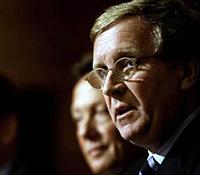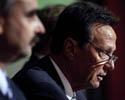News feature, November 13, 2007
Rasmussen's deceit in detail - part two
Michael Rasmussen deliberately misled the UCI regarding his whereabouts prior to the Tour de France, and should not have been allowed to start the Tour, an independent inquiry decided. The 48 page report compiled by the independent Vogelzang Committee set up by Rabobank was released on Monday, and in part two of a two part series Cyclingnews' Susan Westemeyer breaks down the facts.
(Part two continues from Rasmussen's deceit in detail - part one.)
The Rabobank Team

|
Michael Rasmussen was not the only one at fault, the Vogelzang committee found. Both Team Rabobank and the UCI came in for their share of attention in the report. The team has an elaborate structure, with a Supervisory Board, which oversees the Board of Directors. The Chairman of the Board, usually referred to as the team manager, was Theo de Rooy up until the end of July 2007.
The team has equally elaborate rules affecting different issues, as well as a "disaster scenario," which details who is to notify whom and at what point "in the event of a disaster. The plan focuses on, among other things, riders who become seriously compromised," such as through a positive doping control.
The team and the sponsor have a very strict doping policy: "an absolute zero tolerance policy ... This policy is an absolute condition, as well as an absolute commitment on the part of Rabobank and Rabo Wielerploegen B.V. to achieving the sport's objective of fostering a responsible and drug-free sports environment."
Such a statement is usually followed by a "however" clause, and this one is no exception, as the committee found, "the team management was insufficiently aware of the significance of the whereabouts policy." In addition, "the UCI, upon the implementation of the whereabouts policy, indirectly gave the impression that it did not take the policy particularly seriously. The committee further noted that the Rabobank riders, partly as a result of the UCI's relaxed attitude, were insufficiently aware of the necessity to provide very specific whereabouts information."
Much of the committee's report on the team deals with the question of who told who what and when, at various points. It faults the Board of Directors for allowing Rasmussen to start the Tour de France despite evidence of missed tests, saying the board "based its actions entirely on the response from the UCI that Rasmussen would be allowed to start and in doing so failed to calculate the reputation of Rabobank as sponsor and a cycling team in its deliberations regarding whether Rasmussen should be allowed to start in the Tour."
According to the report, "The Board of Directors consequently incorrectly failed to investigate the facts prior to the Tour and neglected its duty to inform the Supervisory Board regarding any of the facts. It is the opinion of the committee that this constitutes negligence both vis-ā-vis the Board of Directors' own responsibility and vis-ā-vis Rabobank's interests.
"After weighing the facts, the committee reaches the conclusion that Rasmussen should not have been allowed to start the Tour."
He did indeed start the Tour, but he was not allowed to ride it to the end. De Rooy removed him from the Tour after the 16th stage, and the Danish rider was subsequently either "suspended" (according to the team's press release) or "fired" (according to the sponsor's press release). "The Chairman's action gives rise to a great deal of ambiguity among the riders, team management and the general public. The general impression is created that it is a case of [Davide] Cassani's word against Rasmussen's word, and it was not clear whether Rasmussen had lied or whether there were sufficient grounds for his dismissal," the report noted.
It concluded, "The Board of Directors ... in general and the Chairman in particular did not give enough credence to a number of indications regarding Rasmussen that they received prior to the Tour and failed to fully and promptly inform the Supervisory Board. They consequently endangered the reputation of both Rabo Wielerploegen B.B. and Rabobank.
"The committee is of the opinion that, based on the facts prior to the Tour, Rasmussen should not have been allowed to start in the Tour."- The Vogelzang Committee on Team Rabobank's decision to start Rasmussen in the biggest bicycles race. |
"The committee is of the opinion that, based on the facts prior to the Tour, Rasmussen should not have been allowed to start in the Tour. The committee has not seen any evidence of unethical conduct or a lack of integrity on the part of the Board of Directors of Rabo Wielerploegen B.V."
After the Tour, the Chairman of the Board of Directors, de Rooy, was ordered to a meeting with the Director of the Supervisory Board. Statements of what was said vary, but the result was the announcement on August 3 that de Rooy had decided to resign.
The Vogelzang Committee said that "From the moment that a crisis situation arose (during the Tour), the Supervisory Board should have very explicitly demanded that all information be gathered and presented." In addition, "In view of the reasons for the dismissal of Rasmussen and with regard to the resignation of the Chairman, the Supervisory Board ultimately provided insufficient information to the other members of the Board of Directors, the team management and the riders."
The International Cycling Union

|
The International Cycling Union (UCI) was criticized for its application, or lack thereof, of its own regulations. "The committee believes that the non-application of a sanction by an authorised body that is part of that authorised body's own regulations sends the wrong message to the individuals for whom those regulations are intended."
In its general conclusion, the committee said, "The UCI is insufficiently precise, insufficiently unambiguous, insufficiently coordinated, insufficiently effective and overly random with respect to its formulation and application of its own anti-doping regulations and sanctions measures."
The committee particularly criticized the UCI for its attitude towards the whereabouts requirements. "The committee has noted that the UCI itself, particularly in the beginning, gave the impression that it did not take the whereabouts information particularly seriously. Both the team management of Rabo Wielerploegen B.V. and the riders were under the impression that the UCI considered the obligation imposed by the WADA to be an administrative burden. In addition, the committee has observed that riders, partly as a result of the relaxed attitude taken by the UCI, were insufficiently aware of the necessity to provide very specific whereabouts information."
"The UCI is insufficiently precise, insufficiently unambiguous, insufficiently coordinated, insufficiently effective and overly random..."- The independent Vogelzang Committee on the UCI's actions. |
In its recommendations, the committee repeatedly emphasized the need for greater professionalism from the UCI. "Professionalism is not only needed in the field of formulating regulations, but also in the area of enforcing and monitoring doping regulations."
It recommended that "Research should be conducted to find a system of establishing riders' location that does not infringe so severely on the riders' privacy. Rasmussen says that riders 'do not always cycle with a fax machine on their back' and are not always able to provide whereabouts information. The possibilities for a more service-oriented system for the riders that also makes it possible to conduct fast and up-to-date tests should be studied."
The "recorded warnings" came in for two recommendations. First, that "clarity should be provided regarding whether and, if so, when recorded warnings are added together." The second was that "It should be possible to make recorded warnings public, similar to the yellow cards used in football."
For monitoring and enforcement, the panel recommended that "both the number of tests and the quality of the execution and enforcement system should be improved in order to enhance the credibility of the anti-doping policy." There must be better coordination in the field of regulating and enforcing the whereabouts system, and perhaps fewer bodies should be allowed to conduct tests."
Finally, it recommended that "a distinction should be made in the regulations between whereabouts information that has been submitted erroneously (too late) on purpose or not on purpose and the punishment should depend on this distinction."
The Sponsor
Piet van Schijndel, of the Executive Board of sponsor Rabobank, applauded the report, calling it "critical and extremely thorough." The bank has asked the members of the team's Supervisory Board to discuss the report's findings with the UCI, saying "It is imperative that this report not be shelved."
In a press release, the sponsor noted that "The report is critical regarding the actions of the Board of Directors before and during the Tour de France. Serious errors of judgment were clearly made, primarily by the Chairman of the Board of Directors. When viewed from this perspective, the Chairman's decision shortly after the Tour to accept responsibility for the consequences ensuing from the resulting crisis is a respectable one."
The statement goes on to note that "The Board of Directors actually knew before the Tour de France that some matters were not being handled properly. Rabobank agrees with the Vogelzang Committee that the Board of Directors made an error of judgment by not revealing information and by not immediately disclosing this information to the Supervisory Board of Rabo Wielerploegen B.V. It is patently obvious from the information now known that Rasmussen should not have been allowed to start in the Tour de France."
In order to prevent future problems, van Schijndel noted that the interim team manager "has already begun to implement changes to the operations together with the Board of Directors in anticipation of this report. The aim is for the Board of Directors to provide a clear review of the changes that have been made to the operations as a result of this report by the end of the year. This will include modifications to matters such as the approach to dealing with whereabouts and changes to the way the medical supervision is organized."
Photography
For a thumbnail gallery of these images, click here
Images by AFP Photo
- Peter Vogelzang, a former chief of the Utrecht Police and head of the 2004 Dutch Olympic team, headed the independent committee hired by Dutch bank Rabobank to investigate Michael Rasmussen's dismissal.
- The panel concluded that it couldn't determine whether Michael Rasmussen was doping or not, but was sure the Dane should never have been allowed to start the Tour de France.
- The committee showed a clear presentation of its findings as to whether Danish rider Michael Rasmussen should have been allowed to start this year's Tour de France.
- The presentation displayed a long list of 'cons' to Michael Rasmussen's participation in the Tour de France.
- Members of the independent Vogelzang committee look on as their findings are presented to the media.
- A member of the committee presents the findings to the assembled media.

